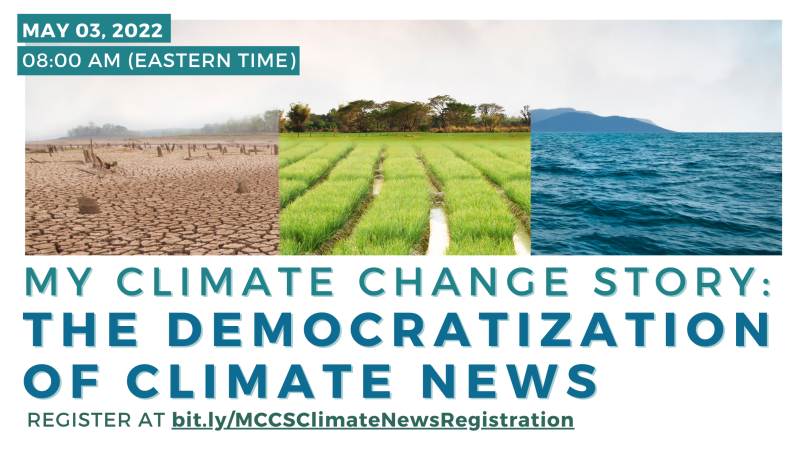My Climate Change Story: The Democratization of Climate News
The complete discussion surrounding climate change is an abstraction. What does two degrees Celsius actually mean to people? Information and debate are dominated by national governments, large enterprises, scientists, and academia. The vast majority of media depend on these experts for their coverage of climate change. Our community’s experience has been ignored; and left out of the search for solutions.
My Climate Change Story is a project initiated by the International Association of Women in Radio and Television (IAWRT) to collect climate change vignettes from the people experiencing climate change first-hand and working together to protect the environment to make a difference. Submissions will be uploaded to My Climate Change YouTube Channel to begin a global discussion.
On March 18, 2022, we held our first event, in parallel with the 2022 UN Commission on the Status of Women, offering training in producing short videos using a cell phone. The two-hour session was oversubscribed by more than three times what the Zoom platform was able to accommodate, giving us a sense of the depth of interest and need for this training. The workshop covered ways to make the most of cell phone video capability – planning and storyboarding, angles and shot framing, and editing and uploading to YouTube channel – through demonstrations in plenary sessions and practical experience in breakout rooms. Workshop participants receive access for follow-up assistance.
On the occasion of World Press Freedom Day, May 3, 2022, we are organizing a virtual event to discuss the democratization of climate information. In the first part of the webinar, we will present two of the seven-minute vignettes submitted to My Climate Change YouTube channel. It will be followed by a panel of experts who will speak to the UNESCO theme and climate journalists. This past December Sasha Chavkin, of the Organized Crime and Corruption Reporting Project and the Columbia Journalism Review, reported “Many of the countries that have seen the most violence against environmental defenders in recent years also rank near the bottom of the World Press Freedom Index.” Journalists must feel confident and safe to report their stories for the greater public good.
IAWRT’s ‘My Climate Change YouTube channel’ will contain original film shorts (three to seven minutes) created by women of all ages from countries around the world. The channel will be organized to highlight common themes, and to encourage future collaborations among participants, across boundaries of geography, culture, and age. Contents will be shared with journalists, to add personal experience to climate news that otherwise focuses only on science and statistics, technologies and politics and other distancing facts. Ultimately, our goal is to promulgate the idea that the people most affected by climate change – especially women and girls – and those most active in making a difference have the right to be making decisions that affect their own and their families’ fates and to be involved in the formulating of solutions that are otherwise imposed by national governments and distant corporations.
Our goal is to not only empower our members to use their cell phones to tell their stories, but to also teach other women and girls to produce cellphone cinema, and to also build community support for their everyday work. My Climate Change Story YouTube Channel is a laboratory for innovation and solutions that can be shared and emulated globally.
Panel of Experts include:
- Gaea Katreena Cabico, The Philippines
- UNESCO Asia Pacific
- Elisabeth Eide, JMIC Norway
- Dr. Michelle Ferrier, TrollBusters (USA)
- Teopista Nabusoba, Kenya
We won’t solve the climate crisis unless we solve the misinformation crisis.








